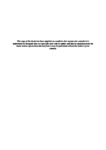Collaboration practices in Intellectual (Learning) Disability Services’ multidisciplinary teams
| dc.contributor.supervisor | Smart, Cordet | |
| dc.contributor.author | Tremblett, Madeleine | |
| dc.contributor.other | Faculty of Health | en_US |
| dc.date.accessioned | 2021-10-28T07:56:55Z | |
| dc.date.issued | 2021 | |
| dc.identifier | 10536668 | en_US |
| dc.identifier.uri | http://hdl.handle.net/10026.1/18186 | |
| dc.description.abstract |
This thesis takes an approach that combines discursive psychology, conversation analysis and ethnography to explore how collaboration works in practice. Clinical guidance refers to collaboration as the chosen form of teamwork for multidisciplinary teams (MDT). Professionals in intellectual (learning) disability (I(L)D) services are advised by NHS England to collaborate in MDTs to address the multiple and complex needs of clients. However, clinical guidance for healthcare professionals uses the term collaboration without explaining what collaboration might look like. Previous research on collaboration focuses on the barriers and facilitators to collaboration, again treating collaboration as a concept that does not need explanation or exploration. The aim of this thesis was to explore collaboration, walking the line between producing high quality conversation analysis whilst making meaningful findings that are needed by healthcare professionals. The findings were framed by their clinical, relational and organisational domain, as these areas have previously been highlighted as important to healthcare professionals (Smart et al., 2018). Three I(L)D teams participated in the research. The researcher spent a one-week observation period, and ran three interviews with professionals from each team (a total of nine), to get a background on the day to day lives of the teams. 12.5 hours of team meetings were recorded for analysis. Analysis of the I(L)D teams’ interactions focused on three collaboration practices, arranged using the framework of clinical, relational and organisational domains. In the clinical domain, potential risk issues were found to be raised as concerns by healthcare professionals. If healthcare professionals raised the concern as their own opinion, early in a discussion, team members gave space in the meeting to hear the issue and provided advice. In the relational domain, laughter was observed to be used by team members to demonstrate orientation to playframe and to soften trouble in interaction. Embedded laughter that occurred did not divert the focus of the meeting and was explored for its relational role. In the organisational domain, orientation to professional identity was used to negotiate tasks, particularly when resisting proposed task allocation. Using professional identity to successfully claim deontic authority allowed the delicate management of conflict in task negotiations. All together these practices begin to uncover how healthcare professionals do collaboration. They demonstrate how power and authority is managed between professionals in MDTs to get work done, how they can use the limited moments in meetings to feel part of a team, and how the team can be used to share responsibility when making risk decisions. All these practices address key issues that are specific for I(L)D MDTs. Although they have been situated in a framework that splits clinical, relational and organisational domains, the individual practices are not limited to a single domain. However, the framework can help healthcare professionals understand and apply the findings to their own practice, both as a reflective tool and as strategies that they could implement. | en_US |
| dc.language.iso | en | |
| dc.publisher | University of Plymouth | |
| dc.rights | Attribution-NonCommercial-NoDerivs 3.0 United States | * |
| dc.rights.uri | http://creativecommons.org/licenses/by-nc-nd/3.0/us/ | * |
| dc.subject | Conversation Analysis | en_US |
| dc.subject | Collaboration | en_US |
| dc.subject | Learning Disabilities | en_US |
| dc.subject | Teamwork | en_US |
| dc.subject | Multidisciplinary | en_US |
| dc.subject.classification | PhD | en_US |
| dc.title | Collaboration practices in Intellectual (Learning) Disability Services’ multidisciplinary teams | en_US |
| dc.type | Thesis | |
| plymouth.version | publishable | en_US |
| dc.identifier.doi | http://dx.doi.org/10.24382/867 | |
| dc.rights.embargodate | 2022-10-28T07:56:55Z | |
| dc.rights.embargoperiod | 12 months | en_US |
| dc.type.qualification | Doctorate | en_US |
| rioxxterms.version | NA | |
| plymouth.orcid.id | 0000-0002-0490-9938 | en_US |
Files in this item
This item appears in the following Collection(s)
-
01 Research Theses Main Collection
Research Theses Main



